Congratulations! We have come to the halfway point reading through the Bible in one year (with two trips through the Book of Psalms!). We are using the ONE YEAR BIBLE reading plan.
You can get the Scripture portions online: http://oneyearbibleonline.com/daily-oyb/?version=49&startmmdd=0101
TODAY’S READING FROM THE OLD TESTAMENT- 2 KINGS 18:13- 19:37;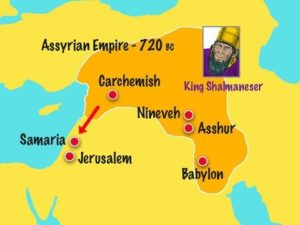
Shalmaneser (Shalmaneser V) was the Assyrian king who attacked the northern kingdom of Israel, deporting its population, the ten tribes, into their captivity in Assyria, and replacing them with Gentiles from Babylon, Cuthah, Avva, Hamath and Sepharvaim who settled in the towns of Samaria.
Shalmaneser was overthrown by his younger brother, Sargon II, who not only completed the defeat of the kingdom of Israel but also conquered Babylon, uniting it with the Assyrian Empire.
Sargon was killed in 705 BC while leading a campaign to Tabal, which had rebelled against Assyrian rule 7 years earlier. He is succeeded by his son, Sennacherib, the grandson of Tiglath Pileser III.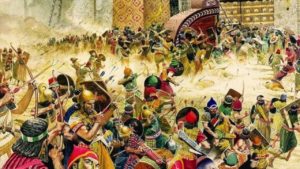
Our reading starts with Sennacherib capturing all the fortified cities of Judah! (2 Kings 18:13). This assault leaves King Hezekiah cowering. He is pressured into saying, “I have done wrong.” He gives Sennacherib all the silver that was found in the temple in Jerusalem, even stripping the gold from the doors and doorposts of the temple!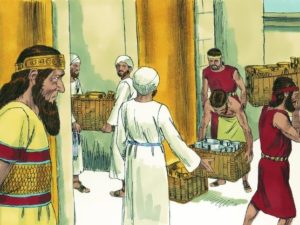
Sennacherib is not yet appeased. He sends messengers to King Hezekiah with intimidating accusations. His messengers make sure that they are speaking in Hebrew and not just Aramaic, understood by the officials. He wanted to intimidate all the people, especially those who were posted to guard the palace walls. The messengers publicly ridicule Hezekiah for any relationship of cooperation with Egypt or dependence upon the Lord. He sends a message that threatened the lives of all at the King’s Palace.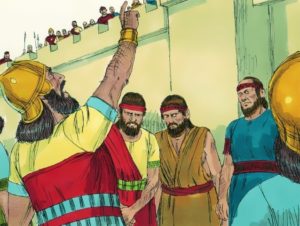
The Assyrian commander insists that the people of Judah hear the words of the great king of Assyria, and not listen to the Hezekiah.
2 Kings 18:29-30 29 “Thus says the king, ‘Do not let Hezekiah deceive you, for he will not be able to deliver you from my hand; 30 nor let Hezekiah make you trust in the LORD, saying, “The LORD will surely deliver us, and this city will not be given into the hand of the king of Assyria.”
How do you respond to the taunts of the enemy? The words of the Assyrian commander remind us of the devil, Satan, the adversary, the slanderer, the father of lies, the accuser of the brethren (Revelation 12:10; John 8:44).
Do you know what it is to have the Lord ‘bridle your tongue’ (Psalm 39:1)? Are you swift to hear and slow to speak? (James 1:19)
Hezekiah wisely advises the people not to answer him (2 Kings 18:36). Those who wrestle with skunks end up smelling like them! They also can fall into traps. May the Lord govern our tongues! Jesus stood silent and did not answer the devious questions of the great high priest (Mark 14:61).
Hezekiah humbles himself before the Lord, tears his clothes, which is a sign of repentance and grief, and he goes before the Lord in the temple. He sends Eliakim, the palace administrator, to the prophet Isaiah to receive a word of wisdom from the Lord that would rebuke the messenger of Sennacherib.
Isaiah, the son of Amoz, served as a prophet for the kings of the southern kingdom of Judah forty years during the reigns of Azariah (Uzziah), Jotham, Ahaz, and Hezekiah.
2 Kings 19:5-7 5 So the servants of King Hezekiah came to Isaiah. 6 Isaiah said to them, “Thus you shall say to your master, ‘Thus says the LORD, “Do not be afraid because of the words that you have heard, with which the servants of the king of Assyria have blasphemed Me. 7 “Behold, I will put a spirit in him so that he will hear a rumor and return to his own land. And I will make him fall by the sword in his own land.”‘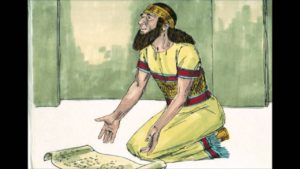
Sennacherib then sends a letter to Hezekiah, once again ridiculing him for thinking that the God upon whom he depends could prevent Jerusalem from being handed over to the Assyrians.
Hezekiah’s response to Sennacherib’s intimidation is instructive. He puts the entire situation in the Lord’s capable hands:
2 Kings 19:14 14 Then Hezekiah took the letter from the hand of the messengers and read it, and he went up to the house of the LORD and spread it out before the LORD.
Hezekiah’s prayer is full of faith and realism. He recognizes Who God is and what He has done but does not live in a dreamland. He acknowledges that indeed the Assyrian conquest has been pervasive. He cries out to the Lord for help:
2 Kings 19:19 19 “Now, O LORD our God, I pray, deliver us from his hand that all the kingdoms of the earth may know that You alone, O LORD, are God.”
Hezekiah has a desire to see the Name of the Lord honored and glorified. He casts his cares upon the Lord knowing that the Lord cares for him (1 Peter 5:7).
Psalm 55:22 22 Cast your burden upon the LORD and He will sustain you; He will never allow the righteous to be shaken.
Isaiah sends back word that the Lord has heard Hezekiah’s prayer. Isaiah replies in his particular prophetic style that assures Hezekiah that the Lord is in control. Isaiah prophesies that a remnant of the house of Judah will take root below and bear fruit above. Even with captivities to come, there will be a remnant of survivors coming out of Jerusalem.
The Lord assures Hezekiah that He will defend Jerusalem. That night 185,000 men are put to death in the Assyrian camp through the agency of the angel of the Lord, causing Sennacherib to withdraw.
Sennacherib is eventually cut down with a sword by his sons, who escape to the land of Ararat. Esarhaddon succeeds Sennacherib as king of Assyria.
TODAY’S READING FROM THE NEW TESTAMENT – ACTS 21:1-16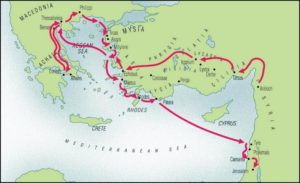
Paul and his associates are still determined to make their way to Jerusalem to deliver the offering to the brothers in need there. They make it to Syria, landing at Tyre. They stayed with the disciples there for 7 days.
Once again Paul is forced to weigh the reality that trouble awaits him in Jerusalem, possibly imprisonment or death. The Holy Spirit continually reminds Paul that his mission would involve hardship, suffering, and pouring himself out in love for Christ.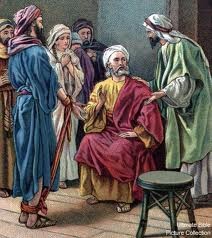
After 7 days with the saints at Tyre, the disciples and their families go with Paul to the portside, kneel and pray as he sets sail for Ptolemais. Paul makes the most of every port of call, meeting with the disciples, encouraging them in the Word, and spending time with them in fellowship and prayer.
At Caesarea, Paul stays at the house of Philip the evangelist. (Philip is the only one in the New Testament who is specifically called an ‘evangelist’ (Acts 21:8), though all of us are called to do the work of an evangelist (2 Timothy 4:5).
We meet Philip’s four unmarried daughters who prophesied, that is, they had a Spirit-wrought ability to speak forth words that build up, cheer up, stir up and, at times, predict future events (1 Corinthians 14:3). These ladies prophesy, but are not called prophetesses. Agabus is called a prophet, meaning that he had a recognized function at that time in the body of Christ to deliver a word from the Lord. This gift became less prevalent when the New Testament Scripture became the final authority of faith and practice for the church. Agabus’ warning was no surprise for Paul, for the Lord had already told him that he would suffer. Yet Paul was committed to fulfilling the will of the Lord. He was “ready not only to be bound, but also to die in Jerusalem for the name of the Lord Jesus” (Acts 21:13).
Paul finally arrives in Jerusalem! There he stays in the home of Mnason, a Cypriot, and one of the early disciples in the church at Jerusalem.
TODAY’S READING FROM THE BOOK OF PSALMS- PSALM 149:1-9
Have you noticed that as we get close to the end of the Bible’s songbook, the Book of Psalms, that each psalm is full of exhortations to praise the Lord?
Praise. Sing. Rejoice. Make up a new song. Praise his name with dancing. Use musical instruments. Don’t just sing at your fellowship gatherings, sing for joy on your beds!
Praise and sing with the Word of God, with a double-edged sword in your hands!
Hebrews 4:12 12 For the word of God is living and active and sharper than any two-edged sword and piercing as far as the division of soul and spirit, of both joints and marrow, and able to judge the thoughts and intentions of the heart.
The word of God is His instrument that will carry out all judgment, so live as one who must give an account.
Take action against the enemies that war against your soul with fresh obedience to God’s holy Word. THIS IS THE GLORY OF ALL HIS SAINTS!
TODAY’S READING FROM THE BOOK OF PROVERBS- PROVERBS 18:8
Proverbs 18:8 8 The words of a whisperer are like dainty morsels, and they go down into the innermost parts of the body.
PRAY FOR THE NATIONS-
Please continue to pray for the States of India.
KARNATAKA-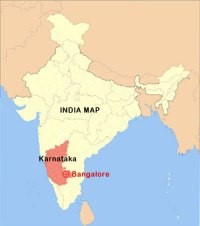
Karnataka is South India’s most spiritually needy state. Beyond the growing (and increasingly expensive) cities, rural areas are largely gripped by poverty. Christian communities tend to be dormant, inward looking and culturally isolated- the wealthier multi-language churches of Bangalore and the south (CSI) and the more Catholic coastal districts. Pray for a breakdown of all barriers to witness and the gospel. Hinduists are intensifying their campaigns to pass an anti-conversion law. There are now over 1,000 attacks each year by Hindu militants against Christians, in part due to the positive response that evangelism receives in some quarters. However, this also strengthens the faith and resolve of Karnataka churches.
Bangalore is the center of India’s rapidly growing IT and software industries and the fastest-growing city in India. It is also home to over 800 Christian ministry headquarters.
Bangalore’s Christian community was mostly middle and upper class in the past, but now many lower castes and slum dwellers are becoming believers. Yet despite being 8% of the population, Christians have thus failed to make any major impact on Bangalore. Christians here must not leave God’s work to full time missionaries from elsewhere; pray for a revival of the churches and for their mobilization to allow all Karnataka to hear the good news.
PRAYER: Lord, we need to depend upon You and not give in to the intimidation of the enemy. We cast all our cares upon You, knowing that You care for us. You alone are God. You are our strength, our song, and our salvation! Whom then, should we fear? Thank You, Father, for giving us the victory in Christ. We mourn the foolishness of those who act as if they are fit to rule their lives without You. You are the worthy King, the king of all kings. Thank You for speaking to us through the Books of I and II Kings and reminding us that we are still living in “The Book of the Acts of the Holy Spirit in the Church”. We want to sing to You a new song of praise today, in Jesus’ Name. Amen.
